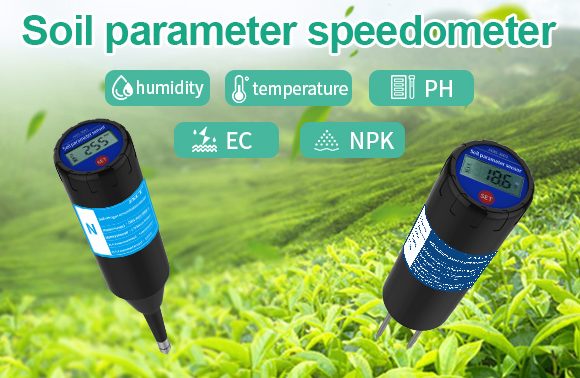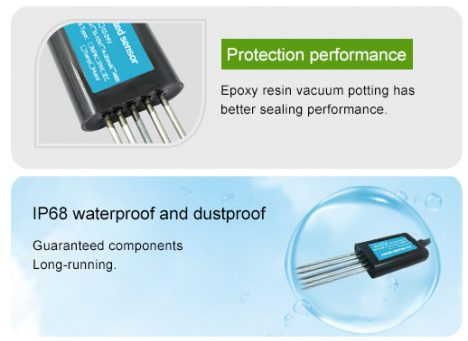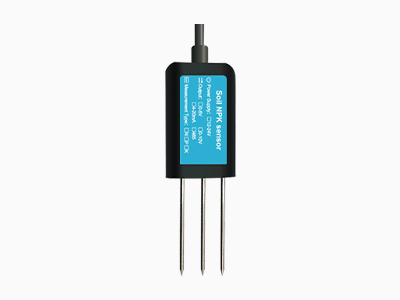In this article, we will learn about the interfacing of Soil NPK Sensor . The soil nutrient content can be easily measured using NPK Soil Sensor. Measurement of soil content N (nitrogen), P (phosphorus), and K (potassium) is necessary to determine how much additional nutrient content is to be added to soil to increase crop fertility.
The soil fertility is using NPK sensors. A major component of soil fertilizer is nitrogen, phosphorus, and potassium. The knowledge of the soil nutrient concentration can help us to learn about nutritional deficiency or abundance in soils used to endorse plant production.
There are multiple methods of measuring the soil nutrient content like using some optical sensors or using the spectrometer. But the spectral analysis method is not convenient and the drawback is the data are only 60-70% correct. Comparing the spectral analysis method with the traditional wet chemical method, the product accuracy is not fully resolved.
So, here we will use a JXCT Soil NPK Sensor to detect the soil nitrogen, phosphorous & Potassium in a soil. The JXCT Soil NPK sensor is a low cost, quick responsive, high precision & portable Sensor that works with Modbus RS485. The advantage of this sensor over a traditional detection method is that it gives very fast measurement & data are highly accurate. All you need is to insert its probe in soil . So, let’s learn in detail about the interfacing of Soil NPK Sensor.
Understanding the Soil NPK Sensor
The soil NPK sensor is suitable for detecting the content of nitrogen, phosphorus, and potassium in the soil. It helps in determining the fertility of the soil thereby facilitating the systematic assessment of the soil condition. The sensor can be buried in the soil for a long time. It has a High-quality probe, rust resistance, electrolytic resistance, salt & alkali corrosion resistance, to ensure the long-term operation of the probe part. Therefore, it is suitable for all kinds of soil. It is suitable for the detection of alkaline soil, acid soil, substrate soil, seedling bed soil & coconut bran soil.

The sensor doesn’t require any chemical reagent. Since it has High measurement accuracy, fast response speed, and good interchangeability, it can be used with any microcontroller. You cannot use the sensor directly with the microcontroller as it has a Modbus Communication port. Hence you need any Modbus Module like RS485/MAX485 and connect the sensor to the microcontroller.
The sensor operates on 9-24V & power consumption is very low. While talking about the accuracy of the sensor, it is up to within 2%. The nitrogen, phosphorous & potassium measuring resolution is up to 1mg/kg (mg/l).

Using this Soil NPK Sensor, you can make your own Arduino Soil NPK Meter or any Cloud IoT Based Soil Nutrient Content Monitoring System.
Applications of Soil Nutrient Sensors
Soil NPK Sensors find diverse applications across agricultural and environmental sectors, offering valuable insights into soil fertility, nutrient management, and crop production. The following are key applications of Soil NPK Sensors:

- Precision Fertilizer Management: Soil NPK Sensors enable farmers to assess the real-time nutrient status of their fields, guiding precise fertilizer applications based on actual soil nutrient needs. By implementing site-specific nutrient management strategies, farmers can optimize fertilizer use, reduce input costs, and minimize nutrient runoff, leading to more sustainable agricultural practices.
- Nutrient Monitoring in Specialty Crops: Soil NPK Sensors are particularly beneficial for monitoring nutrient levels in specialty crops, where precise nutrient management is essential for quality and marketability. These sensors support the optimization of nutrient applications in high-value crops such as fruits, vegetables, and ornamentals, ultimately contributing to improved crop quality and market competitiveness.
- Soil Health Assessment: Soil NPK Sensors contribute to comprehensive soil health assessment by providing insights into the nutrient balance and availability in the soil. Monitoring NPK levels helps in identifying nutrient deficiencies, imbalances, or excesses, supporting sustainable soil management practices and enhancing long-term soil fertility.
- Research and Development: People often think of laboratory soil NPK sensors in agriculture, dynamic, fertilizer efficiency and used to study the nutrient. These sensors facilitate data-driven research on soil-plant interactions and nutrient cycling in agroecosystems, leading to advancements in agricultural practices and technologies.
- Environmental Monitoring: Soil NPK Sensors play a crucial role in environmental monitoring programs, helping to assess the impact of agricultural activities on soil nutrient levels and nutrient leaching. By monitoring NPK dynamics, these sensors support efforts to mitigate nutrient pollution and protect water quality, contributing to sustainable environmental stewardship.
